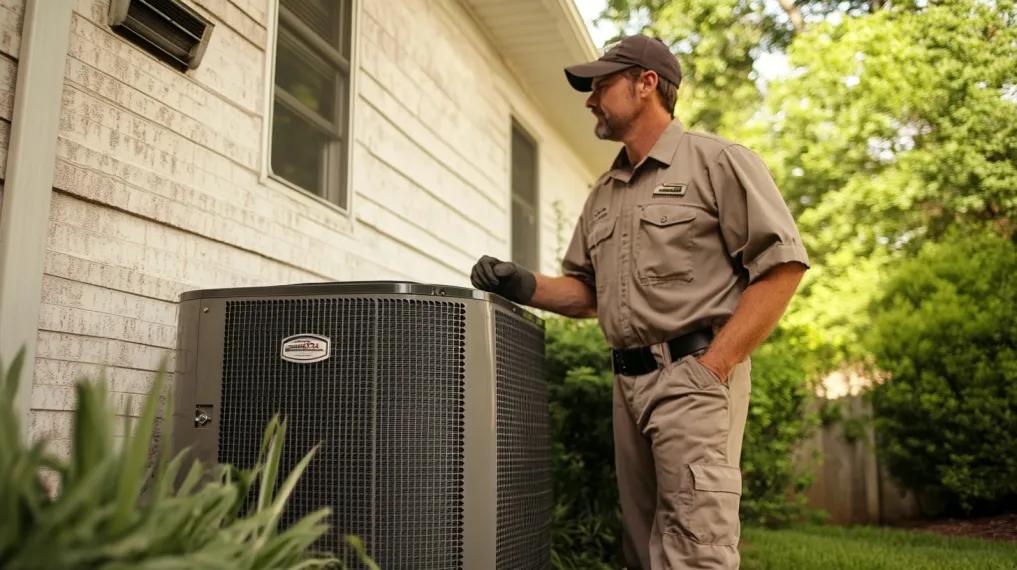What Is an AC Capacitor?

A Complete Guide to How Air Conditioner Capacitors Work and Their Replacement Costs
Your air conditioner’s capacitor plays a crucial role in powering your system – without it, your AC would be unable to cool your home on hot summer days. If your air conditioner suddenly stops working, the capacitor could be at fault and may need to be replaced. HVAC.com explains what an AC capacitor is, signs it may be failing, and the cost of replacing this key component.
How Does an Air Conditioner Capacitor Work?
Located inside your outdoor unit and resembling a small cylindrical canister, the capacitor stores electricity that it uses to provide the initial jolt to start the air conditioner’s motor. Once the AC starts up, the capacitor reduces its electrical output and uses a consistent flow of electricity to power it throughout its full cycle.
Most modern air conditioners have a dual capacitor that provides both the start and run functions, while older, more basic units may consist of separate run and start capacitors. Dual capacitors provide a higher level of convenience because they are more compact and are easier for HVAC technicians to replace.
Signs Your AC Capacitor Needs to Be Replaced
- Warm Air: Initially, it may appear your air conditioner is working because you can hear it running. However, if the temperature isn’t decreasing or is rising, the capacitor might be faulty. This issue occurs because the capacitor can’t start the motor or compressor, which is responsible for expelling warm indoor air outside. Without this critical function, your home will remain hot and stuffy.
- Higher Energy Bills: If your energy bills are significantly higher than usual without any corresponding heat wave, your capacitor might be malfunctioning and in need of replacement. A damaged or underpowered capacitor can cause components such as the motor and compressor to work harder, increasing your energy costs.
- Air Conditioner Suddenly Turns Off: A defective capacitor can cause your air conditioner to shut down completely during a cycle or cause it to short cycle. If this happens, contact a reputable HVAC technician to inspect the unit and determine if the capacitor is the issue.
- Humming Sound: A humming noise coming from your outdoor unit can indicate an issue with the AC capacitor or the fan motor. Typically, this noise suggests that the capacitor's microfarads (or power levels) are too low, causing it to fail get the compressor up to full speed.
- Weak Airflow: A faulty capacitor may fail to provide enough electrical power to properly operate your air conditioning system. While you might feel some cool air from the vents, the system will not run at its full capacity.
- AC Won’t Turn On: If the AC capacitor is completely dead, your air conditioner won’t turn on at all because it can’t supply the necessary electrical boost to start the motor.
How Long Does an AC Capacitor Last?
An AC capacitor typically lasts about 10 years on average but can fail anywhere between 5 and 20 years. Factors influencing the lifespan of an AC capacitor include extreme temperatures, rust and corrosion, electrical issues, poor installation, and age.
How Much Does an AC Capacitor Cost?
The average cost to replace an AC capacitor, including parts and labor, ranges from $125 to $400. Factors influencing the cost include:
- The size of your HVAC system
- The type of HVAC unit
- Labor costs
- Warranty coverage
- The type of capacitor
Maintaining Your Air Conditioner Capacitor
Maintaining an AC capacitor involves regular inspections and testing to ensure it functions properly. Routine air conditioning maintenance should include checking for signs of wear, such as bulging or leaking, and measuring the capacitor’s voltage and capacitance using specialized equipment.
Testing is crucial because a failing capacitor can lead to inefficient cooling, increased energy bills, and potential damage to other HVAC components. Regularly testing your AC capacitor helps identify issues before they cause more significant problems or system breakdowns, ensuring optimal performance and extending the lifespan of your air conditioning unit. Because there are risks involved in testing an AC capacitor, it’s typically a job better left to a professional HVAC technician.